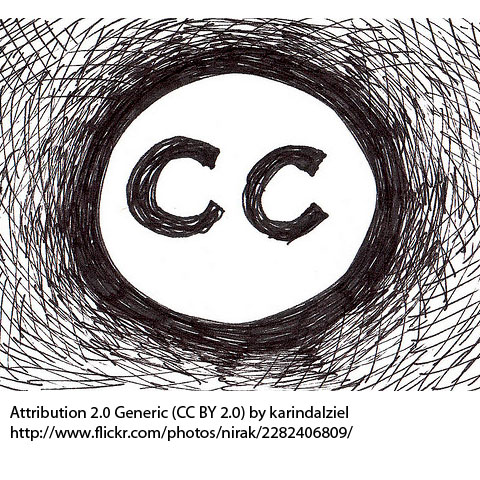
Levels of awareness about copyright and other Intellectual Property Rights (IPR) amongst academics are fairly low. Engagement with OER creation forces individuals and institutions to reexamine their attitudes and policies regarding the ownership of IPR in scholarly content. Traditionally, in the UK, ownership of such content has been passed over to commercial publishers in the form of articles for research journals and student textbooks.
From the Creative Commons website, the key terms of the core suite of Creative Commons licenses are: Attribution, NonCommercial, NoDerivatives and ShareAlike. These license elements are succinctly described as follows:
Attribution. You let people copy, distribute, display, perform, and remix your copyrighted work, as long as they give you credit the way you request. All CC licenses contain this property.
NonCommercial. You let people copy, distribute, display, perform, and remix your work for non-commercial purposes only. If they want to use your work for commercial purposes, they must contact you for permission.
ShareAlike. You let people create remixes and derivative works based on your creative work, as long as they only distribute them under the same Creative Commons license that your original work was published under.
NoDerivatives. You let people copy, distribute, display, and perform only verbatim copies of your work — not make derivative works based on it. If they want to alter, transform, build upon, or remix your work, they must contact you for permission.
The relationship with commercial academic publishers has become too unbalanced over the last two decades with the prices of research journals and textbooks rising far more rapidly than inflation. This has led to the common situation that university libraries can no longer afford to buy back their own research for their students to read. In many ways this sums up the progress of neoliberalism1 over the same period, with the rising dominance of property rights to the exclusion of other rights and increasingly severe laws to protect and extend the rights of property in the digital domain. There is a clear parallel here to property law development and enforcement in 18th century England (Corrigan & Sayer,1985).
Left to its own devices neoliberalism tends to strangle the sources of its own wealth – the creative ability of individuals and society. In reaction to the unbalanced use of IPR law by commercial publishers the Creative Commons organization (http://creativecommons.org/) proposed a simple set of legal tools to empower individuals and organizations across a wide range of activities to manage the IPR in their own creative outputs. This initiative has been extraordinarily successful and has been adopted around the world, showing evidence of a common need. The ALTO project has been using the licences developed by the Creative Commons, without which, it is fair to say, much of our work would have been practically impossible.
A legal innovation that the project has implemented has been the use of a customized version of a Creative Commons licence to support sharing just within the UAL, which has also introduced the valuable concept of the ‘UAL Commons’. This is modelled on earlier work in Canada in the state of British Columbia (https://creativecommons.org/weblog/entry/26963) this licence was based on the Creative Commons BY-NC-SA licence with additional restrictions to restrict use to within the UAL. This addresses the issue of building trust between the staff from the six highly autonomous individual colleges that constitute the UAL to support inter-college sharing.
Future Work
A simple but vital aspect of future work in this area is providing access to awareness raising learning resources for academics and students about the legal aspects of OER engagement.
1For those readers who are new to the subject of neoliberalism this entry in Wikipedia gives a good start: http://en.wikipedia.org/wiki/Neoliberalism. The A Short History of Neoliberalism by David Harvey, Oxford, University Press, give an excellent introduction to the economics and politics of the subject especially covering the globalisation phase. For those readers interested in the current and future trajectory of neoliberalism then this entry in Wikipedia is the place to start: http://en.wikipedia.org/wiki/Financialisation the book Meltdown: The End of the Age of Greed (Verso) by the BBC economics editor Paul Mason give a highly accessible introduction to current trends.
| Attachment | Size |
|---|---|
| altopaperhelsinki-11.doc | 146 KB |

This text, OER Legal Spaces, by Team ALTO is licensed under a Creative Commons Attribution 3.0 Unported license.

